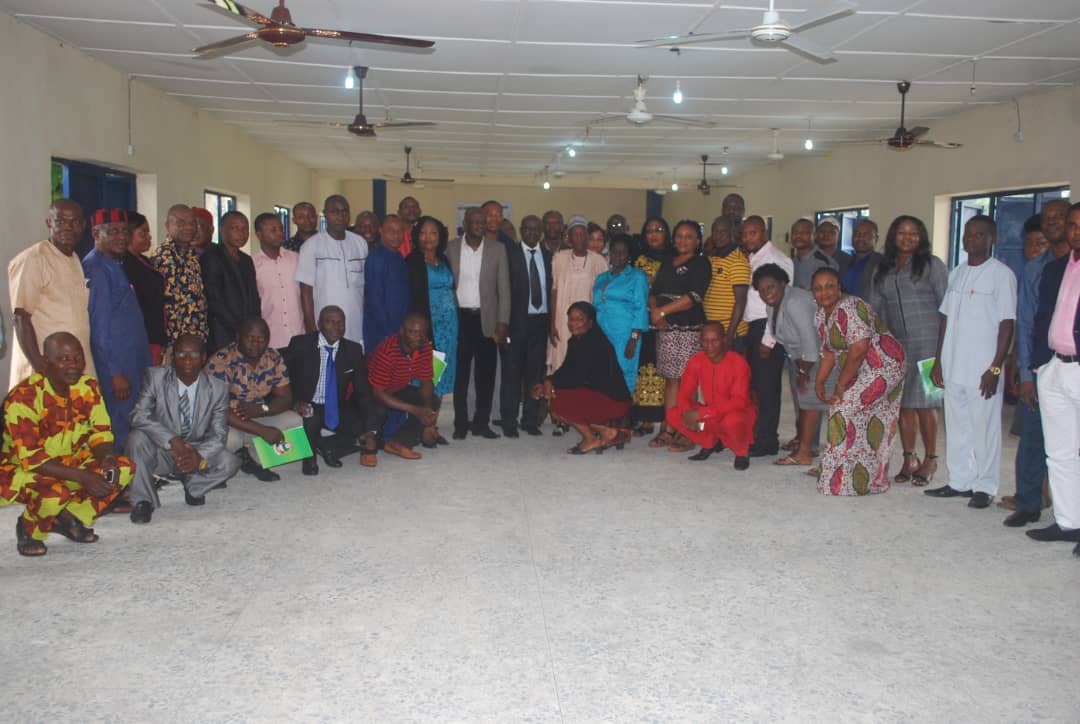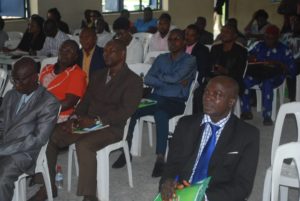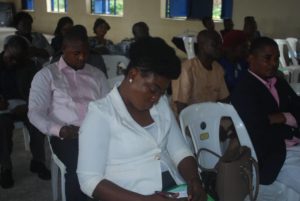By Uchino Amatey
The Cross River State Universal Basic Education Board (SUBEB) in collaboration with Universal Basic Education Commission (UBEC) has ended a 3-day training on implementation of School Based Management Committee – School Improvement Programme (SBMC-SIP) at the West African People’s Institute (WAPI), Calabar.
The event which was kicked off on Monday 8th, July 2019 with members of the SBMC Committee, SUBEB Monitoring Officers amongst others came to a close Wednesday 10th July, 2019.
The Executive Chairman, State Universal Basic Education Board (SUBEB), Stephen Odey, said the SBMC-SIP was essential because it will afford communities the opportunity to contribute positively to themselves through infrastructural development.
According to him “Some schools in our respective Communities lack some essential amenities required for them to function. It is stressful for our Communities to raise money to embark on any activity or project that will bring succour to some of our primary and secondary schools. This is why this initiative by the Federal Government is very important, I understand very clearly that if Communities are embarking on school projects, they are only required to provide ten percent of the total amount that will be required and Government will provide the rest.”
The Executive Chairman who was represented by the Director of Administration, SUBEB, Emmanuel Ojong said the training was also necessary for SBMC members as stakeholders in their various Communities to enable them pass on accurate information to other members of their Communities.
“I consider this training very essential because it is our belief that when you, as stakeholders get the information given, you will go and cascade it. After this training, you will now have the responsibility of sensitising your respective Communities on what they can do to access funds from Federal Government. We hope that at the end of this training lots of school in our rural Communities will come up with projects which we can used to obtain assistance from the Federal Government,” he stated.
Director Social Mobilization, SUBEB, Francis Asaru said the School Improvement programme (SIP) was set up to improve schools through infrastructural development and other needs.
“Before now it was SBMC but now we have the School Improvement Programme which is anchored on SBMC. This training workshop is to arm stakeholders with the knowledge on how to access project funds and implement said projects.”
Asaru said SBMCs is a Government policy set up to encourage Communities to take ownership of schools in other to curb vandalism, truancy and to support Government efforts for quality education.
“The school belongs to the people and that’s the gospel that SBMC preaches. So, we want the Community to know that for every time they neglect their community they are doing the next generation a great disservice, because the school belongs to the Community, spirits don’t vandalise schools people do and within Community setup they know who the criminals are. If the Government has built a school and sent twelve teachers to a school and only three teachers are coming to the school and the Community cannot hold Government responsible to say where are the remaining teachers they are doing themselves a disservice, the remaining teachers will still get paid, so that is why the SBMCs are very important. You serve as our eyes and ears in your various Communities,” he explained.
UBEC Consultant for SBMC-SIP, Ola Ayodele stated that the SBMC-SIP is an improvement on the former self help projects which enables Communities take ownership of their schools, identify challenges and provide inputs such as infrastructure, training materials etcetera.
Ayodele stated that the SBMC-SIP programme allows Communities with functional SBMCs to access Government funds to implement projects under three categories of Micro, Macro and special projects through provision of counterpart funds.
He explained that, “Micro projects allow Communities to apply for up to two hundred and fifty thousand naira for a counterpart fund of twenty-five thousand. For the macro project Communities can access up to two million naira, so the Community will need to generate two hundred thousand naira. The special cases for the whole State are limited, a maximum of two or three schools will be able to benefit from that and it allows them to apply for five to seven million naira. They need to be able to produce between five hundred to seven hundred thousand naira in counterpart fund.”
Ayodele further stated that the counterpart fund generated by Communities do not have to be monetary but Communities can also access funds by providing working materials or artisans to assists in such projects.
He stated that the introduction of the SBMC-SIP initiative has helped to control bureaucratic bottlenecks and helped to entrench transparency.
He added that about 80 schools will be able to benefit from SBMC-SIP in the State. In his words “These funds from the federal Government are sent directly to the School Base Management Committee’s account, it is not passing through the State or the LGA so the issues of kickbacks and bribes that took place during the self-help have been reduced to the barest minimum. The signatory to the SBMC-SIP account also includes the school head, so in a situation where anything happens the Government has someone to hold responsible, it has thrived in other States, Cross River is the final State to round up this set of trainings that we are doing. Other States have already sent in their own applications to UBEC, Cross River will be compiling theirs and then approved schools will be given further training on how they can mobilise resources. The Social Mobilization department can liaise with Abuja and see how they can strengthen their system to be at par with some other States that have advanced.”
Ayodele said for a functional educational system Government and Communities need to work together, adding that this training will spur Communities to take action.
“For the educational sector to thrive it must fly on a two winged system, the Government on the one side and the Community on the other side. Government cannot do everything, even when Government lacks the political will if you have the right advocacy and the Community mounting pressure Government will actually deliver better than they have done. My hope is that this training workshop will stimulate the process and a lot of people will begin to canvass for it, they will need to have a mechanism in place to track how far they have gone, other schools are going to benefit if only these schools work well. Some of these schools will be able to attract other projects next year depending on how they perform, so it is a whole process and we are optimistic to seeing better results.” He said.




Leave feedback about this